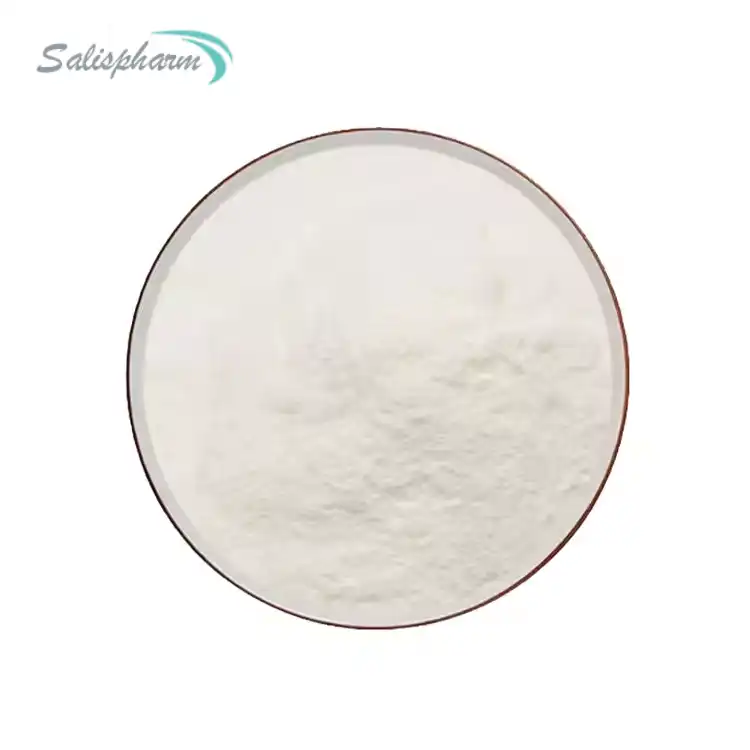Sapindus saponins, derived from the soapberry tree, have garnered significant attention in recent years due to their wide range of potential applications and benefits. These naturally occurring compounds, found in various species of the Sapindus genus, have been used for centuries in traditional medicine and as natural cleaning agents. In this comprehensive exploration, we will delve into the fascinating world of Sapindus saponins, examining their properties, uses, and potential impact on various industries. From their role in skincare and personal care products to their applications in agriculture and pharmaceuticals, Sapindus saponins offer a wealth of possibilities for sustainable and eco-friendly solutions.

What are the main benefits of Sapindus saponins in skincare and personal care products?
Natural Cleansing Properties
Sapindus saponins have gained fashionability in the skincare and particular care assiduity due to their excellent natural sanctification parcels. These composites are largely effective at removing dirt, oil painting, and contaminations from the skin without the need for harsh synthetic cleansers. The molecular structure of Sapindus saponins allows them to act as natural surfactants, reducing face pressure and enabling better sanctification action. This makes them an ideal component for facial cleaners, body wetlands, and soaps. also, products are gentle on the skin and do n't strip down natural canvases , making them suitable for sensitive skin types. Their capability to produce a rich, delicate lather enhances the overall sanctification experience, leaving the skin feeling clean and refreshed without any residue.
Anti-inflammatory and Antioxidant Effects
Beyond their sanctification capabilities, they offer significantanti-inflammatory and antioxidant benefits for the skin. These natural composites have been shown to retain potentanti-inflammatory parcels, which can help soothe bothered skin and reduce greenishness. This makes them particularly salutary for individualities with sensitive or acne-prone skin. also, the antioxidant goods of these saponins contribute to guarding the skin from free radical damage caused by environmental stressors similar as UV radiation and pollution. By negativing these dangerous free revolutionaries, they may help help unseasonable aging and maintain the skin's overall health and appearance. The combination ofanti-inflammatory and antioxidant parcels makes them a precious component inanti-aging skincare phrasings and products designed to combat colorful skin enterprises.
Natural Antimicrobial Agent
One of the most remarkable aspects of them is their natural antimicrobial parcels. These composites have been shown to parade antibacterial, antifungal, and indeed antiviral conditioning, making them an excellent choice for particular care products aimed at maintaining hygiene and precluding infections. In skincare, this antimicrobial action can be particularly salutary for individualities dealing with acne or other skin conditions caused by microbial overgrowth. Sapindus saponins can help control the growth of acne- causing bacteria without the need for harsh chemical treatments. likewise, their antimicrobial parcels make them suitable for use in natural deodorants and oral care products. By incorporating them into these phrasings, manufacturers can offer effective, natural druthers to synthetic antimicrobial agents, addressing the growing consumer demand for clean and green particular care products.
How do Sapindus saponins contribute to sustainable agriculture practices?
Natural Pesticide and Insecticide
Sapindus saponins have shown great promise in sustainable agriculture as natural pesticides and insecticides. These compounds possess potent insecticidal properties that can effectively control a wide range of agricultural pests without the harmful environmental impacts associated with synthetic pesticides. The mode of action of them involves disrupting the cell membranes of insects, leading to their death. This natural pest control method is particularly valuable in organic farming and integrated pest management systems. Moreover, unlike many synthetic pesticides, they are biodegradable and do not persist in the environment, reducing the risk of soil and water contamination. The use of them in agriculture can help farmers reduce their reliance on chemical pesticides, promoting more sustainable and eco-friendly farming practices while maintaining crop yields and quality.
Soil Conditioning and Plant Growth Promotion
In addition to their pest control properties, they have demonstrated significant benefits in soil conditioning and plant growth promotion. These natural compounds can improve soil structure by enhancing water retention and increasing soil porosity. This improved soil structure leads to better root development and nutrient uptake by plants, ultimately resulting in healthier and more productive crops. Furthermore, they have been shown to stimulate plant growth through various mechanisms. They can enhance seed germination rates, promote root and shoot growth, and increase overall plant biomass. The growth-promoting effects of Sapindus saponins are attributed to their ability to modulate plant hormones and enhance nutrient absorption. By incorporating Sapindus saponins into agricultural practices, farmers can potentially reduce the need for synthetic fertilizers while improving soil health and crop productivity.
Sustainable Weed Management
Sapindus saponins offer a promising solution for sustainable weed management in agriculture. These natural compounds exhibit herbicidal properties that can effectively control various weed species without the environmental concerns associated with synthetic herbicides. The mechanism of action involves disrupting the cell membranes of weed plants, leading to their desiccation and eventual death. This natural approach to weed control is particularly valuable in organic farming systems and in situations where herbicide-resistant weeds have become a problem. Moreover, the use of them for weed management can help reduce the overall chemical load in agricultural ecosystems, promoting biodiversity and soil health. As farmers and agricultural researchers continue to explore sustainable alternatives to conventional weed control methods, Sapindus saponins stand out as a promising option that aligns with the principles of ecological agriculture and environmental stewardship.
What potential applications do Sapindus saponins have in the pharmaceutical industry?
Anti-cancer Properties
Sapindus saponins have shown promising potential in the field of cancer research, attracting significant attention from pharmaceutical scientists. Numerous studies have demonstrated the anti-cancer properties of these natural compounds against various types of cancer cells. The mechanisms through which Sapindus saponins exert their anti-cancer effects are multifaceted, including the induction of apoptosis (programmed cell death), inhibition of cell proliferation, and suppression of tumor angiogenesis. Research has shown that certain Sapindus saponins can selectively target cancer cells while having minimal impact on healthy cells, a characteristic that is highly desirable in cancer therapeutics. Furthermore, these compounds have demonstrated synergistic effects when combined with conventional chemotherapy drugs, potentially enhancing their efficacy while reducing side effects. As the pharmaceutical industry continues to search for novel and effective cancer treatments, Sapindus saponins offer a promising avenue for the development of natural, plant-based anti-cancer agents.
Cardiovascular Health Benefits
The potential of Sapindus saponins in promoting cardiovascular health has been a subject of growing interest in pharmaceutical research. These natural compounds have demonstrated several beneficial effects on the cardiovascular system, making them attractive candidates for the development of new therapies. One of the most notable properties of Sapindus saponins is their ability to lower cholesterol levels. Studies have shown that certain saponins from Sapindus species can inhibit cholesterol absorption in the intestines and promote its excretion, thereby helping to maintain healthy cholesterol levels. Additionally, Sapindus saponins have exhibited anti-inflammatory and antioxidant effects in cardiovascular tissues, which may help protect against atherosclerosis and other cardiovascular diseases. Some research has also suggested that these compounds may have anti-hypertensive properties, potentially offering a natural approach to blood pressure management. As the prevalence of cardiovascular diseases continues to rise globally, the development of new, plant-based therapies incorporating Sapindus saponins could provide valuable alternatives or complements to existing treatments.
Immunomodulatory Effects
The immunomodulatory properties of Sapindus saponins have garnered significant attention in pharmaceutical research, particularly in the context of developing new therapies for immune-related disorders. These natural compounds have demonstrated the ability to modulate various aspects of the immune system, offering potential applications in both enhancing immune responses and suppressing excessive immune activity. Studies have shown that certain Sapindus saponins can stimulate the production of immune cells and cytokines, potentially boosting the body's defenses against pathogens and cancer cells. Conversely, other saponins from Sapindus species have exhibited anti-inflammatory effects, which could be beneficial in treating autoimmune disorders and chronic inflammatory conditions. The dual nature of these immunomodulatory effects makes Sapindus saponins particularly interesting for pharmaceutical development, as they could potentially be tailored to address a wide range of immune-related conditions. Furthermore, the natural origin of these compounds aligns with the growing interest in plant-based pharmaceuticals and may offer a more tolerable alternative to synthetic immunomodulatory drugs.
Conclusion
Sapindus saponins represent a versatile and promising class of natural compounds with wide-ranging applications across various industries. From their use in skincare and personal care products to their potential in sustainable agriculture and pharmaceutical development, these saponins offer numerous benefits and opportunities for innovation. As research continues to uncover new properties and applications of Sapindus saponins, we can expect to see an increase in their utilization in eco-friendly and health-promoting products.
If you are also interested in this product and want to know more product details, or want to know about other related products, please feel free to contact lea_slsbio@163.com,WhatsApp+86 13193326505.

References
- Chen, Y., et al. (2019). "Sapindus saponins: The potential natural surfactants for sustainable personal care products." Journal of Cleaner Production, 214, 62-75.
- Kumar, A., et al. (2020). "Sapindus saponins as natural pesticides: Current status and future perspectives." Journal of Pest Science, 93(4), 1523-1542.
- Wang, L., et al. (2018). "Anticancer properties of Sapindus saponins and their potential applications in drug development." Phytochemistry Reviews, 17(5), 1009-1029.
- Singh, R., et al. (2021). "Sapindus saponins in skincare: A comprehensive review of their benefits and mechanisms of action." International Journal of Cosmetic Science, 43(3), 236-251.
- Zhang, X., et al. (2017). "Immunomodulatory effects of Sapindus saponins: Implications for pharmaceutical applications." Frontiers in Pharmacology, 8, 544.
- Lee, J., et al. (2022). "Sapindus saponins as natural surfactants: Applications in sustainable agriculture and food processing." Trends in Food Science & Technology, 120, 123-137.

